Movie Retrospective: Foreign Correspondent
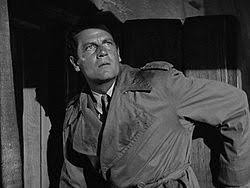
It’s not often that a film by a foreign power is the subject of praise from the Minister of Propaganda of a totalitarian state. But Alfred Hitchcock’s 1940 thriller impressed Josef Goebbels no less. The man who would eventually succeed Adolf Hitler as Chancellor of Germany for one day in 1945 referred to the film as ‘A masterpiece of propaganda, a first-class production which no doubt will make a certain impression upon the broad masses of the people in enemy countries.’ The source of such admiration may have seemed unlikely at the time of Foreign Correspondent’s theatrical release, in August 1940, but the remarks proffered were not too wide of the mark. Released the same year as Hitchcock’s Oscar-winning Rebecca, the Joel McCrea picture postured as a spy story, but, of course, there was an underlying intent which went deeper than its fundamental premise. Hitchcock’s second American film was made to address and – dare I say – inspire American audiences in the first instance. 16 months before the neutral country would enter the theatre of conflict itself, the film encouraged its citizens to educate themselves about the state of affairs in Europe and it also sought to elicit no small degree of affinity. It’s little wonder indeed that Goebbels was so forthcoming with his compliments. An impression was the desired effect of the film – an impression which might stir further action and translate into outright collaboration.
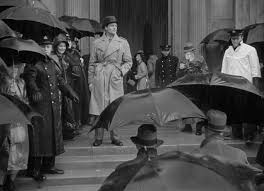
The time is August 1939 and the outbreak of war appears imminent in Europe. Joel McCrea plays Johnny Jones, a self-assured and striking journalist with the New York Morning Globe. Jones is not the foreign correspondent of the title per se (he is a crime reporter in point of fact), but he is assigned the mission by his editor Mr. Powers (Harry Davenport) nonetheless because Powers is frustrated by the lack of solid and reliable news coming from that part of the world – ‘I want someone who doesn’t know an -ism from a kangaroo. A good honest crime reporter is what the Globe needs. It’s what Europe needs. There’s a crime hatching on that bedeviled continent.’ Jones is tasked with the brief of uncovering ‘The biggest story in the world today’ and given the pseudonym Huntley Haverstock. His first stop is in London where he comes into contact with Stephen Fisher (Herbert Marshall), the leader of the Universal Peace Party as it’s called. In a romantic context, Jones is also introduced to Fisher’s daughter Carol (Laraine Day), but more about this shortly. A third character – quite crucial to the whole design as it turns out – is a Dutch diplomat by the name of Van Meer (Albert Basserman) whom Jones meets by chance in a cab. When the older gentleman is called away to a peace conference in Amsterdam, the perfectly natural thing for Jones (now the foreign correspondent introduced to all as Haverstock) to do is to follow him there so that he can conduct a proper interview.
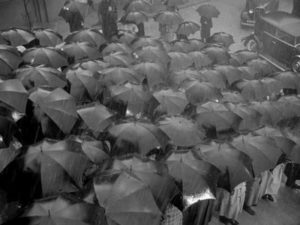
Fans of Hitchcock will readily appreciate how the master liked to include iconic landmarks and elaborate set-pieces in his films. Foreign Correspondent is certainly not short of these. The scene at the peace conference in Amsterdam is probably best remembered on account of the profusion of dark umbrellas which populate the frame. It has an undoubted and indelible visual impact, but also lends itself to the story at hand when an assassin (who shoots Van Meer) manages to evade the authorities thanks to the cover provided. In the pursuit which ensues, Jones meets Carol Fisher once again and a rather dapper reporter by the name of Scott ffollliott (George Sanders) who takes the time to explain that the capital letter in his surname has been dropped in memory of an ancestor executed by Henry VIII. The chase brings them to a cluster of windmills somewhere in the Dutch countryside (another example of the director using familiar features to telling effect) where the assassin seems to have a rendezvous. But a surprise awaits Jones in one of the structures – the real Van Meer who was evidently swapped out prior to the shooting. The tension which permeates the scene as Jones hovers above Van Meer’s captors – doing his level-headed best to avoid detection – has all the hallmarks of a classic Hitchcock composition. There is anxiety. There is suspense. There are even some flourishes of humour. The overall effect is to involve the audience in the most profound of ways – to spur them on in their support of the protagonist whilst damning the villains for their scheming proclivities.
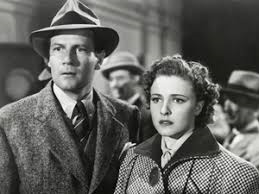
This pattern continues a while later when Jones has two unwanted guests in his hotel bedroom purporting to be Dutch police. Escaping via an outside ledge, he finds himself in Carol’s room (naturally) where he manages to persuade her of the overarching scheme which is afoot. The two take a boat back to London where they are forced to sleep on deck. In the briefest of possible scenes, Johnny proposes marriage to her and Carol promptly accepts. But there’s a catch of course – arriving at Stephen Fisher’s house in the capital, Jones immediately smells a rat when he recognises one of the devious conspirators from the windmill in Holland – Mr. Krug (Eduardo Cianelli). A personal source of tension now arises for the protagonist with regard to Fisher and – more especially – his daughter. Does Carol know that her father is in league with the other side? And if she does, how far does her own collusion possibly extend? The sinister Krug has his own particular ideas for dealing with Jones and concocts a plan whereby a man seemingly assigned to protect the journalist will dispose of him for once and for all. Aficionados of Hitchcock will recognise the soft features of Edmund Gwenn who plays Rowley, the man who attempts to kill Jones. Gwenn appeared in a total of four Hitchcock films during the course of his career – one of his most famous and endearing roles was that of Captain Wiles in 1955’s The Trouble with Harry. The scene which takes place in the cathedral steeple is again a winning mix of apprehension and uncertainty and just a smidgen of black humour. When a body is shown falling from the elevation of the church, we the audience are unsure as to whether or not it is Jones. And Hitchcock delays the revelation for just long enough to make us wonder about this. Would he really kill off his central character so relatively early in the film and at such a critical juncture? 20 years later – in 1960’s Psycho – the master would discard his so-called heroine Marion Crane in an infamous shower scene. That particular screen departure arrived after a mere 48 minutes (yes, I did time it). Jones – as you might have guessed by now – fares much better than the Janet Leigh character.
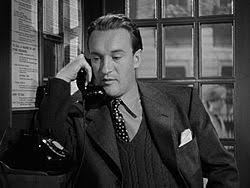
The upshot of the attempt on Johnny’s life is that Fisher is revealed to be something other than the ‘genial head of the peace party.’ Confiding with ffolliott on the matter, Jones learns that Van Meer was a signatory to a peace treaty which contained a clause that was never put on record, but rather memorised by the participants (Clause 27). The ever-resourceful ffolliott suggests the ruse of a fake kidnapping of Fisher’s daughter so that he can interrogate the traitor alone. The plan does not work however and only serves to drive a near-permanent wedge between Johnny and Carol. Determined that she never wants to see him again, Carol agrees to return to America with her father. War is now an absolute certainty he tells her; there is no possible way to prevent it. But the young lady’s suspicions are aroused when Fisher declares that he has to meet some people on a matter of business. At the house where Van Meer is being held captive, Hitchcock gives audiences of the day a sense of what modern torture methods might entail. The elderly official is subjected to sleep deprivation by means of loud music and glaring light. He resists these instruments of persuasion at first, but eventually succumbs upon Fisher’s arrival and when more physical techniques are applied. Albert Bassermann – who was nominated for an Oscar for Best Supporting Actor (he lost out to Walter Brennan for The Westerner) – then delivers one of the keynote speeches of the film as he derides the so-called powers of the world (Nazi Germany in particular) for preying on the smaller more vulnerable nations – ‘I see now. There’s no help. No help for the whole poor suffering world. Oh you cry peace Fisher! Peace. And there was no peace. Only war and death. You’re a liar Fisher. A cruel, cruel liar. You can do what you want with me. That’s not important. But you’ll never conquer them Fisher. Little people everywhere who give crumbs to birds. Lie to them, drive them, whip them, force them into war. When the beasts like you will devour each other, then the world will belong to the little people.’ The obvious rhetoric aside, this scene is most interesting in relation to the way that Hitchcock and his director of photography Rudolph Mate choose to frame Van Meer and his audience of captors (including Scott ffolliott who is being held at gun-point). The tight compositions of both lend heightened effect to the diplomat’s words. One can well imagine that the character is addressing a wider audience beyond the immediate group. Again, the clear intention here is to rouse attention in an all-inclusive sense, to agitate thinking so that it encompasses more global concerns. It’s as if Hitchcock and his writers are exhorting the audience of the day to take more proactive action. Sitting on the fence will no longer do they tell us. The world will only belong to the little people again when those same little people stand up and fight and claim it back for themselves.
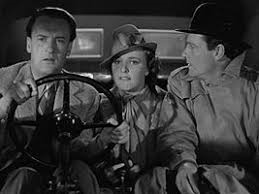
Van Meer is subsequently tortured, but ffolliott’s escape and the arrival of the authorities ensure the diplomat’s rescue before he divulges the full details of Clause 27. As war is declared, ffolliott convinces Jones that they must return to America in pursuit of Fisher who is taking a transatlantic flight with Carol accompanying him. A message intended for ffolliott is intercepted by Fisher and he learns that he will be arrested upon his arrival on American soil. He confesses the true nature of his activities to Carol – who has had her suspicions for some time – ‘I used my country’s methods because I was born with them.’ The aircraft is shelled by a German Destroyer and subsequently crashes into the sea. In something of a redeeming act, Fisher sacrifices his own life so that the other survivors may live, including Jones, ffolliott and Carol. Fortuitously, they are soon rescued by an American boat. Determined that Carol should not be hurt any further, Jones informs ffolliott that he does not intend to publish the truth about Fisher, but Carol persuades him to do otherwise – ‘I’ve got to fight for my country…the hard way.’ The story is published under the name of Huntley Haverstock and in the film’s final scene – described as one of the ‘soldiers of the press’ – Jones delivers a radio broadcast in London as the English capital is subjected to a bombing raid. Imploring his American audience to maintain a conscious vigil, he tells them ‘You’re part of it…keep those lights burning.’ Foreign Correspondent concludes with a rousing version of the Star Spangled Banner and its message in this regard couldn’t be any clearer – the conflict which has started involves the whole world and nations such as America will have to play their part to ensure its freedom. To remain neutral forever will just not do – the forces of right need all the assistance they can possibly get. As anti-isolationist propaganda goes, this is as plain-speaking as the filmmakers can be.
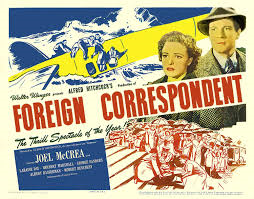
Described by some as second-rate fare or lesser Hitchcock, Foreign Correspondent is certainly not one of the master’s films which automatically rolls off the tongue, but it more than stands up some 80 years after its release and features some fine performances and memorable set-pieces. It’s not a subtle piece, nor is it quite in the same league as some of the other films which Hitchcock would go on to make, but it is a top-notch spy thriller nonetheless which deserves a repeat viewing. Made at the beginning of his Hollywood period, Foreign Correspondent finds Hitchcock in fine form and it represents the work of a director who was not the least bit shy of innovation and a touch of originality. The aforementioned scene involving the assassination in the rain and the plethora of dark umbrellas is one to enjoy time and time again; it’s a superbly-crafted sequence and a promise of things to come from the director. Nominated for a total of six Oscars at the 13th Academy Awards (including Best Picture, Best Supporting Actor and Best Original Screenplay), Foreign Correspondent did not take home any gongs (Hitchcock’s other 1940 film Rebecca won the top award), but it fully deserves its place in any retrospection of the master’s career. It remains a thriller of the highest order and – most critically for its contemporary audience – has an important message to impart. Little wonder that the aforementioned Minister of Propaganda was so impressed.